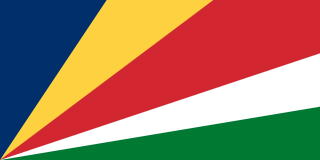
Seychelles, officially the Republic of Seychelles, is an archipelagic island country in the Indian Ocean at the eastern edge of the Somali Sea. It consists of 115 islands. Its capital and largest city, Victoria, is 1,500 kilometres (932 mi) east of mainland Africa. Other nearby island countries and territories include the Comoros, Madagascar, Mauritius, and the French overseas regions of Mayotte and Réunion to the south; and Maldives and the Chagos Archipelago to the east. Its estimated population of 98,462 is the smallest population of any sovereign African country.

The economy of Seychelles is based on fishing, tourism, processing of coconuts and vanilla, coir rope, boat building, printing, furniture and beverages. Agricultural products include cinnamon, sweet potatoes, cassava (tapioca), bananas, poultry and tuna.
In the Seychelles, local and international telecommunications lines are operated by Cable & Wireless. In 1997 there were around 11,000 telephone lines and in excess of 20,000 telephones, meaning that over half of the population have a home telephone.

Seychelles follows a policy of what it describes as "positive" nonalignment and strongly supports the principle of reduced superpower presence in the Indian Ocean. The Seychelles government is one of the proponents of the Indian Ocean zone of peace concept and it has promoted an end to the United States presence on Diego Garcia. The country has adopted a pragmatic policy, however, and serves as an important rest and recreation stop for US ships serving in the Persian Gulf and Indian Ocean. Seychelles' foreign policy position has placed it generally toward the left of the spectrum within the Non-Aligned Movement. Russia, the United Kingdom, France, India, the People's Republic of China, Libya and Cuba maintain embassies in Victoria.

Anigozanthos manglesii, commonly known as the red-and-green kangaroo paw, Mangles kangaroo paw, Kurulbrang (Noongar), is a plant species endemic to Western Australia, and the floral emblem of that state.
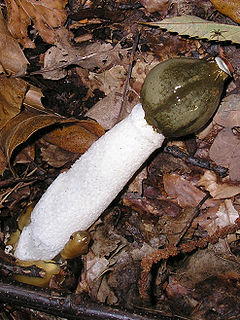
The genus Phallus, commonly known as stinkhorns, are a group of basidiomycetes which produce a phallic, often foul-scented, mushroom, from which their name is derived. The genus has a widespread distribution and, according to a 2008 estimate, contains 18 species. They belong to the family Phallaceae in the order Phallales. The best known species is the common stinkhorn.
The yellow isthmus rat is a species of rodent in the family Cricetidae. It is found only in Panama. It was discovered by W. W. Brown Jr. on the southern slope of Volcan de Chiriqui. He found it common in the upland forest from 1000 to 1500m, but no specimens were taken above or below these elevations. Museum records specify two isolated populations in western Panama, one at Cerro Colorado where R. Pine et al. collected in 1980 and at Cerro Hoya on the Azuero Peninsula by C. Handley in 1962. The presence of I. flavidus or a closely allied form in Costa Rica is probable, however, no specimens have been reported. There are no currently known fossil records of Isthmomys.
The Mount Pirri isthmus rat is a species of rodent in the family Cricetidae.

Seychelles – United States relations are bilateral relations between Seychelles and the United States.

Phallus hadriani, commonly known as the dune stinkhorn, is a species of fungus in the Phallaceae (stinkhorn) family. It is a widely distributed species, and is native to Asia, Europe, and North America. In Australia, it is probably an introduced species. The stalk of the fruit body reaches up to 20 cm (7.9 in) tall by 4 cm (1.6 in) thick, and is spongy, fragile, and hollow. At the top of the stem is a ridged and pitted, thimble-like cap over which is spread olive-colored spore slime (gleba). Shortly after emerging, the gleba liquefies and releases a fetid odor that attracts insects, which help disperse the spores. Said to be edible in its immature egg-like stage, it typically grows in public lawns, yards and gardens, usually in sandy soils. Phallus hadriani may be distinguished from the similar P. impudicus by the presence of a pink or violet-colored volva at the base of the stem, and by differences in odor.

Russia–Seychelles relations is the bilateral relations of Russia and Seychelles. Diplomatic relations between Seychelles and the Soviet Union were established on 30 June 1976, a day after the island nation gained its independence from the United Kingdom. Russia has an embassy in Victoria. Seychelles is represented in Russia through its embassy in Paris (France) and two honorary consulates.
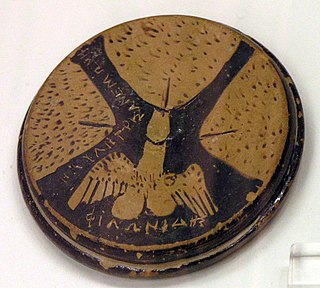
A phallus is a penis, an object that resembles a penis, or a mimetic image of an erect penis. In art history a figure with an erect penis is described as ithyphallic.
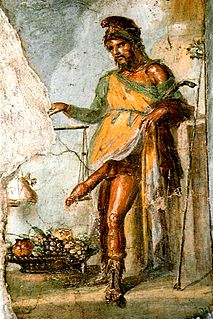
In Greek mythology, Priapus was a minor rustic fertility god, protector of livestock, fruit plants, gardens and male genitalia. Priapus is marked by his oversized, permanent erection, which gave rise to the medical term priapism. He became a popular figure in Roman erotic art and Latin literature, and is the subject of the often humorously obscene collection of verse called the Priapeia.

Anigozanthos flavidus is a species of plant found in Southwest Australia. It is member of the Haemodoraceae family. It is commonly known as the tall, yellow, or evergreen, kangaroo paw. The specific epithet, flavidus, refers to the yellow flowers of this plant.

Phallus paintings in Bhutan are esoteric symbols, which have their origins in the Chimi Lhakhang monastery near Punakha, the former capital of Bhutan. The village monastery was built in honour of Lama Drukpa Kunley who lived in the 15-16th century and who was popularly known as the "Mad Saint" (nyönpa) or “Divine Madman” for his unorthodox ways of teaching, which amounted to being bizarre and shocking.
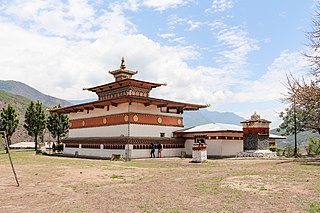
Chimi Lhakhang, also known as Chime Lhakhang or Monastery or temple, is a Buddhist monastery in Punakha District, Bhutan. Located near Lobesa, it stands on a round hillock and was built in 1499 by the 14th Drukpa hierarch, Ngawang Choegyel, after the site was blessed by the "Divine Madman" the maverick saint Drukpa Kunley (1455–1529) who built a chorten on the site.
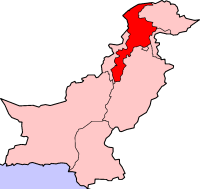
Phallus calongei is a species of stinkhorn mushroom. Found in Pakistan, it was described as new to science in 2009. Starting out as an "egg", the fully expanded fruit body consists of a single, thick, stipe with a cap attached to the apex and covered with olive-green, slimy spore-containing gleba. It is distinguished from other similar Phallus species by a combination of features, including a pinkish, reticulated (network-like) cap, and a stipe that is tapered at both ends. The edibility of the mushroom is unknown.
Dionysiakos is a form of Greek dance and customs from ancient Greece. Dionysiakos and its forms revived today in many areas of Greece like Peloponnese, central Greece and Crete with the best-known the Phallus festival in the area of Tyrnavos, Larissa.

All foreign nationals visiting Seychelles are granted visa free access. They must be in a possession of a valid passport, return or onward ticket, proof of accommodation and sufficient funds. The Visitor’s Permit is issued free of charge and is initially valid for up to three months but it can be extended for a fee for a period of up to three months with further extensions not exceeding total period of twelve months.
Salinihabitans is a Gram-negative, rod-shaped and non-motile genus of bacteria from the family of Rhodobacteraceae with one known species. Salinihabitans flavidus has been isolated from a marine solar saltern from Korea.













